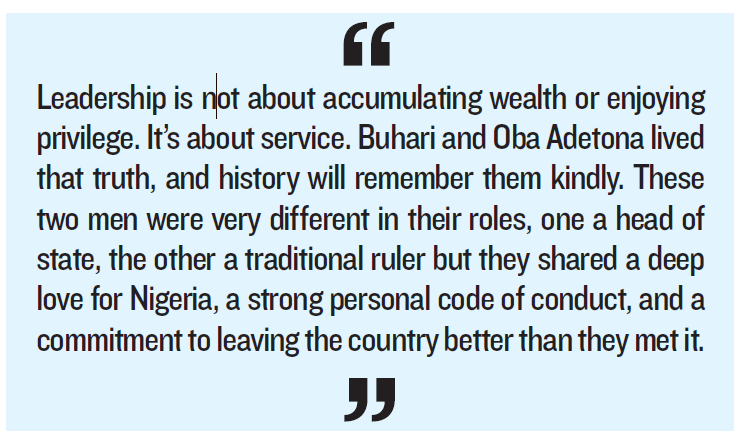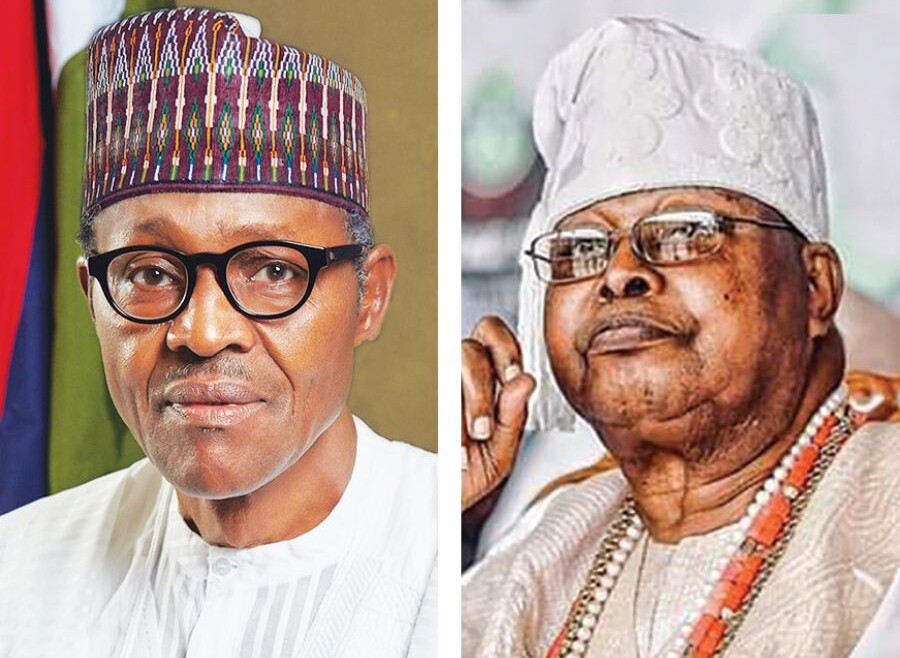
“Surely, the religion with Allah is ISLAM,complete submission”… Qur’an 3:19
The ceaseless tributes trailing the death, last Sunday (July 13, 2025), of the former President Muhammadu Buhari and the Awujale of Ijebuland, Oba Sikiru Kayode Adetona are deep and instructive validating the popular saying that life of impact matters.
Interestingly, the deceased were significant members of Muslim community in Nigeria and thus, their funerals were conducted according to Islamic rites.
Beyond mourning, the Nigerian Muslim community is celebrating the legacy of service of the two prominent national figures as leading Islamic organisations praise their lives of service, integrity, and commitment to faith.
In a series of condolence messages, the Nigerian Supreme Council for Islamic Affairs (NSCIA), the Muslim Ummah of South-West Nigeria (MUSWEN), and the Muslim Rights Concern (MURIC) celebrated the late leaders as exemplars of integrity, faith, and public service. They described Buhari and Oba Adetona as men whose lives stood as testimonies to principled leadership and unwavering devotion to national and religious causes.
The NSCIA as the country’s apex Islamic body, expressed profound grief over the passing of former President Muhammadu Buhari, describing him as a man whose leadership was guided by Islamic values, personal discipline, and a deep sense of duty to the nation.
In a condolence message signed by the Secretary-General, Professor Is-haq O. Oloyede, the Council said, “We mourn the death of our esteemed former President, Muhammadu Buhari, GCFR. His departure marked the end of an eventful journey characterised by sacrifice, service, and commitment to national development.”
The statement recalled Buhari’s unique role in Nigerian history; first as a military head of state in 1983, and later as a democratically elected president in 2015, a feat that underlined the depth of his political resilience and national appeal.
“His integrity, austerity, and commitment to public accountability endeared him to Nigerians across ethnic and religious lines. He embodied the Islamic values of modesty, honesty, and responsibility,” the Council noted.
Under the leadership of its President-General, His Eminence, the Sultan of Sokoto, Alhaji Muhammad Sa’ad Abubakar, the NSCIA extended condolences to Buhari’s widow, Hajia Aisha Buhari, his children, the Emirate of Daura, Katsina State, President Bola Ahmed Tinubu, and all Nigerians. The Council offered prayers for Allah’s forgiveness and mercy upon the late president.
“We pray that his grave becomes a garden from the gardens of Paradise, lit by the light of his good deeds,” the statement read. “May his leadership inspire current and future leaders to lead with purpose, humility, and faith.”
To MUSWEN, former President Buhari distinguished himself as a devout Muslim, a humble leader, and a patriotic figure whose legacy transcends political divides. In a condolence statement signed by its President, Alhaji Rasaki Oladejo, and Executive Secretary/CEO, Professor Muslih Tayo Yahya, the organisation emphasised the former president’s unwavering commitment to nation-building and his capacity to lead with restraint and principle.
“President Buhari’s simplicity, humility, and sense of duty made him one of the most admired leaders in Nigerian history. His commitment to fighting corruption and promoting national security stood out as pillars of his administration,” the group stated.
The regional Muslim body believed that Buhari’s leadership was not only defined by political reform but also by moral strength rooted in his Islamic faith. The group recalled how, even while holding the country’s highest office, Buhari maintained a modest lifestyle, often cited as evidence of his incorruptibility. “Despite being at the helm of power, he did not accumulate properties or live in excess. He led by example, choosing to live within his means and focus on the greater good,” MUSWEN said.

The organisation urged Nigerians to reflect on the late president’s values of service, selflessness, and unity, and called on the Federal Government to immortalise his legacy. “We respectfully call on President Bola Ahmed Tinubu and the National Assembly to consider naming important national infrastructure or institutions after the late President. Doing so would preserve the lessons of his life and inspire future generations.” While praying for Buhari’s admission into Aljannatul Firdaus, MUSWEN also asked the Almighty to comfort his family, supporters, and all Nigerians who mourn his passage.
The Muslim Rights Concern (MURIC) joined in national mourning, hailing Buhari as the “Father of Modern Nigeria.” The organisation highlighted his legacy of infrastructure development, anti-corruption efforts, and integrity in governance as unmatched in recent Nigerian history. MURIC’s Executive Director, Professor Ishaq Akintola, said Buhari was a transformational leader whose impact can still be seen in the country’s transport, energy, and agricultural sectors.
“His infrastructure revolution changed the face of Nigeria,” Akintola said. “His administration delivered on the Lagos-Ibadan, Abuja-Kaduna, and Itakpe-Warri rail lines—projects that had languished for decades before he took charge.”
Akintola praised Buhari for his political courage in challenging corruption and supporting military reform, especially during a period marked by threats from insurgents and economic instability. “Buhari’s style was unique. He was tough on corruption, yet gentle in his interactions with the people. He never lived extravagantly and refused to surround himself with a cult of personality. That kind of leadership is rare,” Akintola noted. He added that MURIC had long referred to Buhari as “Mr. Integrity,” a title he earned through his actions and personal values rather than media campaigns.
“It is not by propaganda. He owned only two houses; one in Daura and one in Kaduna; which he had before he even became president. Who else in our political history can match that level of modesty?” Akintola asked. The group offered its condolences to Buhari’s family, the people of Katsina State, and all Nigerians. They prayed for Allah’s forgiveness for his shortcomings and for a place for him among the righteous in Paradise. Also, Oba Sikiru Kayode Adetona, the Awujale of Ijebuland, who passed away at the age of 91, has been described as one of Nigeria’s most progressive and enlightened traditional rulers. He was known for his sharp intellect, devotion to justice, and for being a rare monarch who championed both cultural preservation and religious freedom.
Adetona as a reformer who “successfully balanced Yoruba cultural heritage with Islamic values.” The group recalled his active role in advocating for the religious rights of traditional rulers, particularly with regard to their burial rites. The monarch’s efforts culminated in the enactment in 2021 of the Obas and Chiefs Law in Ogun State, which ensures that the burial of traditional rulers is conducted in accordance with their religious beliefs, a major shift from older customs that did not always respect such wishes.
“Oba Adetona’s leadership was not just traditional but transformational,” MUSWEN noted. “He saw the need to modernise tradition in a way that respected individual faiths and human dignity.” Until his death, Oba Adetona served as the President of the Ogun Muslim Council and was widely recognised for promoting interfaith harmony. In 2024, he was named the Leader of all Muslim Obas in Yorubaland by the League of Imams and Alfas during their annual conference in Ijebu-Ode. “He was a voice of reason, a royal father, and a committed Muslim whose influence extended far beyond the palace,” MUSWEN said. “He understood that culture and faith can coexist and he lived by that philosophy.”
The group extended its condolences to the royal family, the people of Ijebuland, and the broader Muslim community, praying that Allah grants the monarch eternal peace in Aljannatul Firdaus. As tributes continue to pour in from across the country and beyond, Nigerian Muslim leaders are using the moment to call for reflection and national unity. The deaths of Buhari and Oba Adetona, they said, serve as powerful reminders of the transient nature of life and the enduring value of service, character, and faith.
“These two men were very different in their roles, one a head of state, the other a traditional ruler but they shared a deep love for Nigeria, a strong personal code of conduct, and a commitment to leaving the country better than they met it,” said Professor Oloyede of the NSCIA. According to Professor Akintola of MURIC, Nigeria is in a moment of generational transition, and the passing of such elder statesmen and monarchs should prompt younger leaders to examine their values and legacy. “Leadership is not about accumulating wealth or enjoying privilege. It’s about service. Buhari and Oba Adetona lived that truth, and history will remember them kindly,” he said.
As Muslims across Nigeria offer prayers for the departed, the call is growing louder for their examples to be studied, taught, and institutionalized so that their lives, though ended, continue to shape Nigeria’s journey.
Muslim groups have also urged Nigerian institutions, religious, educational, and governmental, to begin documenting and teaching the leadership models of both men. According to MUSWEN, young Nigerians need concrete examples of public service rooted in values, sacrifice, and accountability. “We often look outside our shores for role models, but we have shining examples at home,” MUSWEN said. “The lives of Buhari and Oba Adetona should be included in civic and moral instruction curricula across schools and madrasahs.”


